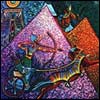We all know the first nights of Passover are a big deal, when we celebrate the Exodus from Egypt. But did you know that something equally dramatic happened on the seventh night? On Shevi’i shel Pesach, we mark the anniversary of the Splitting of the Sea.
In many Jewish communities—both Ashkenazi and Sephardic—there’s a beautiful tradition of staying up late (or even all night) on Shevi’i shel Pesach.
Chassidim, especially Chabad Chassidim, have the custom of staying up the entire night of Shevi’i shel Pesach. Unlike the night of Shavuot, when we learn a specific text (Tikkun Leil Shavuot), Chabad’s custom is to stay up learning1 whatever you wish,2 with an emphasis on the act of simply staying awake.3
Some Sephardim gather in the synagogue at chatzot (halachic midnight) and either recite Az Yashir (the Song of the Sea) verse by verse or sing and dance to its words. Others get up and recite it at dawn.4 Some even pour water on the floor during the dancing, commemorating the Splitting of the Sea.5
Some communities recite special verses and passages from the Zohar, known as the Tikkun Leil Shevi’i shel Pesach,6 while others spend the night retelling the Midrashim and stories of G‑d’s miracles, strengthening their faith in G‑d.7
(And just a heads-up: If staying up all night means you'll totally crash during morning prayers, it’s better to take a nap before praying. Just make sure someone’s waking you up to pray and recite the Shema at the proper time.)
Why do we stay up all night to commemorate the Splitting of the Sea?
Revealing the Hidden Depths of Torah
The Splitting of the Sea wasn’t just the final act of the Exodus—it was a glimpse of something far greater. The Midrash tells us that even a simple maidservant witnessed Divine revelation at the sea to a degree that surpassed that of later prophets. Chassidic teachings explain that this moment offered a preview, or “glimmer,” of the revelation of the Messianic era, when the hidden will be revealed, and G‑dliness will be as obvious as dry land emerging from the sea.
It is brought in the name of the kabbalist Rabbi Chaim Vital, student of the Arizal, that the nights of Hoshana Rabbah, the seventh day of Passover, and Shavuot are an opportune time for revelations of the deepest secrets, so we should make good use of them.8
Auspicious Time for the Final Redemption
The Jewish people did not merit the complete redemption on the first nights of Passover alone. It was only on the seventh night, when the sea split and they sang the Song of the Sea, that their redemption reached its climax.
This final stage of redemption came about through the faith the Jews had in G‑d and in His servant Moses, and in the merit of their future acceptance of the Torah at Mount Sinai.
For this reason, every year, the night of Shevi’i shel Pesach is a spiritually potent time—especially conducive to strengthening faith in G‑d and in His Torah and bringing about the final redemption. It is an opportunity for inner refinement and spiritual elevation. Those who seek to purify and elevate themselves on this night receive extra help from Above—even more than usual.9
A Night of Miracles and Protection
Throughout the night of the Splitting of the Sea, the winds blew, the Egyptian army was closing in, and even the prosecuting angels tried to harm the Jewish people. But G‑d protected them from all sides like a shield.
And here’s the beautiful part: The spiritual energy from that night returns every year, at the same time. That’s how Jewish time works—it’s not just history, it’s a cycle.
So when we learn Torah on this night—G‑d’s wisdom—we actually draw down spiritual protection into our lives, just like our ancestors experienced back then.10
Birth of the Soul - The Night Before Circumcision
There’s another interesting connection.
The Chassidic masters explain that Shevi’i shel Pesach is the time of the “birth of the Jewish souls.”11
The Exodus from Egypt is also known as the birth of the Jewish nation. Rabbi Yehuda Lowe, the Maharal of Prague, says the Jewish people were already getting ready to be “born” on the 14th of Nissan (the day before the Exodus),12 which would make the seventh day of Passover the “eighth day”—the day of spiritual circumcision.
You might’ve heard of vach nacht—the custom of staying up the night before a baby boy’s brit milah (see The mystical origins of the 'Vach Nacht'). So it makes sense that we would stay up the night of Shevi’i shel Pesach, the night before our spiritual brit.13
Interestingly, the Alter Rebbe, Rabbi Schneur Zalman of Liadi, explains that the divine soul fully enters a child at the time of circumcision.14 This connects the explanations that we are staying up before the birth of the Jewish souls and the night before the circumcision.
May we merit the day when “the world will be filled with the knowledge of G‑d as the waters cover the sea.”15







Start a Discussion